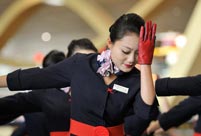 Int'l Snow Sculpture Art Expo in Harbin
Int'l Snow Sculpture Art Expo in Harbin Sichuan money wall for dividend payment
Sichuan money wall for dividend payment Li Na crashes Belinda Bencic in 2nd round at Australian Open
Li Na crashes Belinda Bencic in 2nd round at Australian Open
 Shocking moments when PLA's weapons open fire
Shocking moments when PLA's weapons open fire Famous Lanzhou beef noodles
Famous Lanzhou beef noodles Armed Police hold anti-terrorism drill in SE China's Xiamen
Armed Police hold anti-terrorism drill in SE China's Xiamen Harbin Int'l Ice and Snow Festival opens
Harbin Int'l Ice and Snow Festival opens 'Jin' named the word of the year by cross-strait netizens
'Jin' named the word of the year by cross-strait netizens Chinese scientific expedition goes to build new Antarctica station
Chinese scientific expedition goes to build new Antarctica station
BEIJING, Jan. 23 -- China is likely to see a number of new reform-focused institutions set up in the next few months, after the top-level one, headed by President Xi Jinping, convened its first meeting on Wednesday.
At the meeting of the leading group for overall reform of the Communist Party of China (CPC) Central Committee, Xi asked provincial authorities to set up similar task forces for the same purpose "as quickly as possible," citing an old saying that the whole year's work depends on a good start in spring.
Prof. Zhou Weimin, with the Party School of CPC Central Committee, told Xinhua on Thursday that, without proper institutional designs, it will be impossible to mobilize the country to implement the reform plans put forward in November.
"The key to really implementing reform plans is to clarify who is going to take charge of this task and be held responsible if it is not well carried out," Zhou said.
At the central level, it is clear that Xi, also general secretary of CPC Central Committee, will take the lead.
"A reasonable guess is that provincial party chiefs will head provincial reform task forces," Zhou said.
He predicted that a majority of provincial reform groups will be set up in the next few months, possibly in spring as Xi noted.
A task force headed by the top Party official will be effective in coordinating efforts among different sectors, breaking the undue grip of vested interests and ensuring the CPC's firm leadership of the reform, Zhou said.
A series of reforms have already been put in place after the third plenary session of the CPC Central Committee in November, including the axing of China's reeducation through labor system, an easing of its one-child policy, and reform of the industrial and commercial registration system.
However, more are needed as the grand reform plan listed more than 300 measures under 60 topics.
At Wednesday's meeting, Xi warned of problems in implementing the plan and called for adequate understanding of the difficulty, complexity and urgency of reforms, as deeper and deeper interest group will be affected as reforms go further.
Experts shared Xi's feeling of urgency in implementing the reform plans.
"People's expectation for reform remains high and, thanks to the leadership's strong will and good execution, some progress has been made. This is a favorable environment for fully unfurling the reform plans," said Prof. Xue Lan, dean of the School of Public Policy and Management, Tsinghua University. "I think Xi means we need to seize the right moment."
At Wednesday's meeting, the leading group for overall reform announced its three deputies, Premier Li Keqiang, Vice Premier Zhang Gaoli and Lu Yunshan, a member of the Standing Committee of the Political Bureau of the CPC Central Committee.
The group has six divisions covering the economy and the environment, democracy and law, culture, the social system, Party building, and discipline inspection.
Half of them are directly related to improving the country's governance, Xue said, citing the divisions on democracy and law, Party building, and discipline inspection.
"This is strong proof that China's reform focus has been extended beyond the economy," he said. "In fact, the economic reform, which is to realize the market's decisive role, will also count in reforms in other sectors to regulate the government's functions."
As for the makeup of provincial reform task forces, experts suggested that they might follow the model of the central setup but had better consider local realities.
"The central leadership and provincial task forces will play different roles in the reform drive. In some aspects, local authorities can not act until the central leadership makes the call, while in other aspects, they are free to try based on local situations," Xue said. "That's why their makeup should vary accordingly."
 Int'l Snow Sculpture Art Expo in Harbin
Int'l Snow Sculpture Art Expo in Harbin Highlights of China's air force
Highlights of China's air force Airline crew stage flashmob dance at Kunming airport
Airline crew stage flashmob dance at Kunming airport Asia's heaviest box girder finishes 'rotation' in Wuhan
Asia's heaviest box girder finishes 'rotation' in Wuhan Hot supermodel's new photo album released
Hot supermodel's new photo album released Top15 countries to retire to in 2014
Top15 countries to retire to in 2014 Chinese-branded car passes North America standard safety test for the first time
Chinese-branded car passes North America standard safety test for the first time Chinese naval escort taskforce repels 4 suspicious vessels
Chinese naval escort taskforce repels 4 suspicious vessels Xuelong carries on mission after breaking from floes
Xuelong carries on mission after breaking from floes Li Na beats Bouchard to reach Australian final
Li Na beats Bouchard to reach Australian final  Explore the sources of PM 2.5
Explore the sources of PM 2.5 Highlights of Chinese airborne troops'exercises
Highlights of Chinese airborne troops'exercises  'Living in ice house' competition held in central China
'Living in ice house' competition held in central China  Chinese figure in Oscar nominations
Chinese figure in Oscar nominations  Top ten aerospace events in China 2013
Top ten aerospace events in China 2013Day|Week|Month